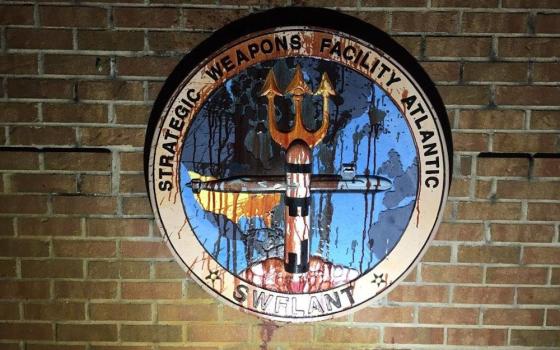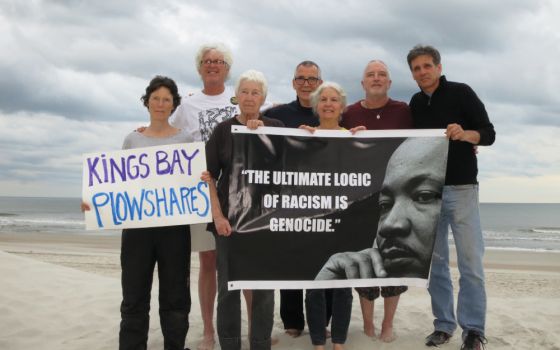Patrick O'Neill, Martha Hennessy, Clare Grady and Carmen Trotta stand outside a federal courthouse in Brunswick, Georgia, with members of their legal team and actor Martin Sheen after their Aug. 7 pre-trial hearing on the Religious Freedom Restoration Act. (NCR photo/Jesse Remedios)
Trials of Nonviolence: The Kings Bay Plowshares story is a three-episode podcast series exploring the motives of seven Catholic peace activists who broke into a nuclear submarine base in Georgia. In the third episode, Bertelsen intern Jesse Remedios tells the story of how the activists fought the United States justice system. The first episode can be found here. The second episode can be found here.
The entire series is available on Apple Podcasts, Spotify, Google Play, or wherever you get your podcasts.
In some ways, breaking onto a nuclear submarine base was just the beginning of their witness. After their arrest, the Kings Bay Plowshares 7 faced another formidable challenge: the United States justice system.
In this third and final episode, we hear the Plowshares activists explain why trial and sacrifice have always been essential to their movement. For one activist, sacrifice included spending her 79th birthday in a jail cell.
We will hear from:
- Elizabeth McAlister, a longtime peace activist who founded Jonah House in Baltimore with her late husband, Philip Berrigan.
- Martin Sheen, a Golden Globe winning actor who has been a supporter of the Plowshares movement from its beginning.
- Clare Grady, a Catholic Worker and activist from Ithaca, New York.
- Carmen Trotta, an anti-war activist and member of the New York Catholic Worker who tried to break into the nuclear missile bunkers on the base.
- Martha Hennessy, a retired occupational therapist from Vermont and granddaughter of Dorothy Day, founder of the Catholic Worker movement.
- Patrick O'Neill, a journalist and founder of the Fr. Charlie Mulholland Catholic Worker House in Garner, North Carolina.
- Paul Magno, former Plowshares activist and a current resident at Jonah House, a faith-based community dedicated to nonviolent civil disobedience.
- Bill Hartman, a retired teacher and former Plowshares activist.
Background reading:
- An NCR editorial writes, "Elizabeth McAlister … embodies the legacy of the movement seen by some as quixotic and absurd tilting at a gargantuan windmill and by others an authentically prophetic witness in the nuclear era."
- Before their trial, the Plowshares activists asked for charges to be dismissed under a law called the Religious Freedom Restoration Act. Their request was denied. A number of prominent celebrities supported their call for dismissal of charges in a "global petition" addressed to Attorney General William Barr.
- In addition to discussing their motivations, the activists attempted to bring international law cited in their self-made "Indictment of Trident" into the courtroom. After three days of trial, it took the jury only two hours to come up with a verdict for the Plowshares.
Audio credit:
- Clip from In the King of Prussia (1983) movie. Audio courtesy of richfishpgh (Youtube user).
[Jesse Remedios is a Bertelsen editorial intern with the National Catholic Reporter. His email is jremedios@ncronline.org. Follow him on Twitter @JCRemedios.]
Advertisement






